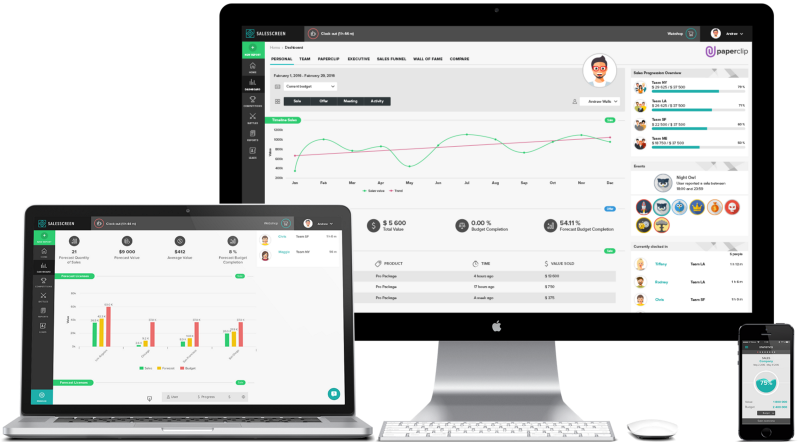
5 Tips to Help You Maximize Your Sales Management Process
Due to tremendous advances in sales technologies and the ability to record, analyze and learn form data over recent years, the entire sales landscape has changed. As a result, sales roles have become more complex and demanding than ever before.
0 min read.
The need to hire, retain, manage and educate sales reps is of paramount importance due to the fact that modern sales reps spend on average only 2.5 years with an organization before moving on to new opportunities. In addition, the minimum estimated cost of replacing a sales rep is between $35,000–80,000 USD!!!
In order to evolve with these rapid changes, sales managers and C-suite executives need to understand how to get the most out of their sales processes so that they can meet revenue targets by leveraging data-based approaches to these complex problems.
Properly select and train new hires.
Modern sales reps are required to take on an understand an incredible amount of information, including quotas, pitches, product information, customer segments, technical information and more. This can be overwhelming even for experienced sales reps and it is essential that onboarding programs target individual skill gaps early in order to reduce the stress of information overload. First, the hiring team needs to ensure that they are targeting and selecting candidates who have the ability to process, digest and sustain large inflows of information. Second, new hires need to be properly coached, mentored and educated so that they are ramping up to sales sufficiency as quickly as possible. Pairing reps with experienced mentors and designing an easy-to-understand sales playbook are essential elements of this first phase. By measuring and collecting data on the results of sales performance, it becomes much easier to effectively coach and provide guidance so that new sales reps become confident in their skills.
Use data to incentivize performance.

Sales incentives and recognition strategies are critical to the development process. When new hires join the team, many of them may be new to selling your type of product or new to sales in general. As a result, some will require more guidance to meet their goals. Without data-driven insight into whether reps are on track with learning and development, managers are unable to proactively course-correct. Real-time data can show, for instance, that one rep may have booked half as many meetings over a given period when compared to his peers and that he/she may be struggling with prospecting skills. Data insights such as these enable sales managers to focus their early-stage efforts on highly targeted opportunities for improvement, resulting in more efficient teams.
Continuously measure proficiency improvements.
Even as your sales force matures and grows, it is essential to continue to monitor performance and provide valuable feedback and skills. There is always something new to be learned and it is the job of sales managers to ensure that their teams are staying focused on staying proficient and achieving professional development. By measuring proficiency and improvement of knowledge and skills of reps over time, management can proactively address gaps before they negatively impact sales numbers or customer service. In the case of high-performing teams, this is managed at scale through ongoing training, development and teamwork sessions which continue to ensure that reps are filling each other’s gaps and consistently improving.
Create a data-based sales coaching plan.
According to a recent study by the Harvard Business Review, sales coaching can be incredibly effective if you target your core performers properly. “The real payoff from good coaching lies among the middle 60% — your core performers. For this group, the best-quality coaching can improve performance up to 19%. In fact, even moderate improvement in coaching quality — simply from below to above average — can mean a six to eight percent increase in performance across 50% of your sales force. Often as not, that makes the difference between hitting or missing goals.' However, most organizations face obstacles to effective coaching. Sales managers are universally strapped for time and may lack the skills to coach effectively. Moreover, some managers may focus on a single opportunity with a prospect rather than help new hires gain core skills and behaviors needed for ongoing success. Using data insights and analysis to achieve a good understanding of reps’ skills and performance, managers can more easily diagnose the skills each rep needs to improve and target coaching on areas that will have the greatest impact.
Leverage the power of gamification.

While still a relatively new phenomenon, gamification is taking the enterprise world by storm due to its ability to track performance in real-time and provide meaningful rewards for the completion of clearly defined business objectives. Gamification is the application of game mechanics, such as points, leaderboards and goals, to non-game settings, such as sales or customer service. By helping sales organizations to clearly define their business goals and then set measurable KPIs around those goals, gamification is highly effective in motivating behavior and driving employee engagement. By tracking performance and then creating real-time progress notifications, rewards & recognition elements, it becomes much easier to create a fun social atmosphere that drives team spirit and builds great company culture. In fact, gamification may be the missing link in creating the perfect sales performance management plan for your organization.







